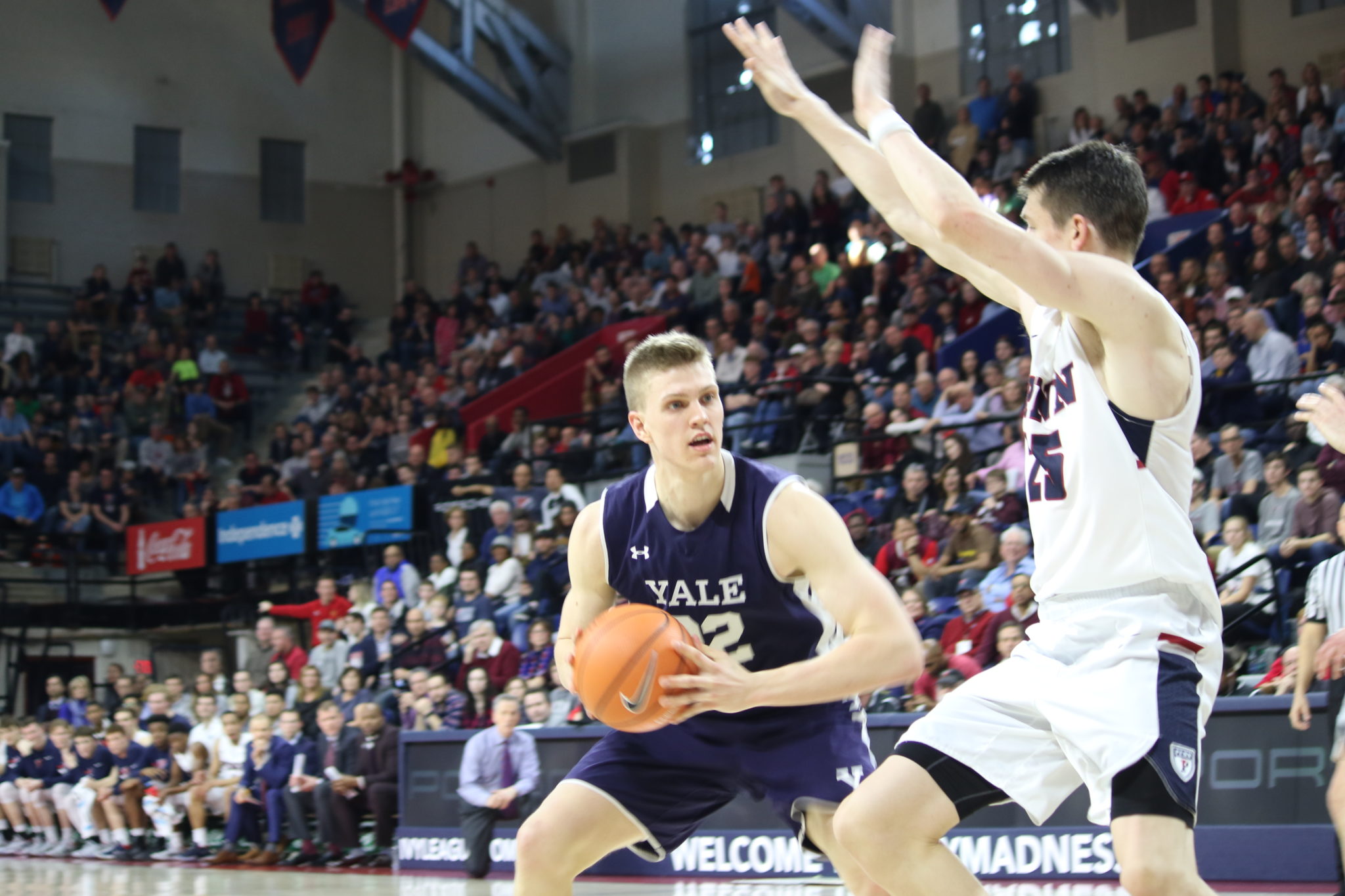
The Yale men’s basketball team arrived in Philadelphia this weekend with seven wins in its past eight games and the hope of advancing to the program’s second NCAA tournament in three seasons. But with every passing minute of the Bulldogs’ Ivy tournament semifinal matchup against Penn, the Elis’ unfortunate fate seemed to crystallize before their eyes.
Yale ultimately dropped an 80–57 affair in 40 minutes of lopsided action against the regular season conference co-champion Quakers, who will advance to face Harvard tomorrow in the Ivy Madness final. The Bulldogs got off to yet another poor start against Penn, and before they could get into a rhythm, the Quakers seized control on their home court.
“We got into a bad groove and we just couldn’t dig ourselves out,” head coach James Jones said. “Last weekend in New Haven we went down by 14 points, and we had a surge with our defense and our energy that brought us back to win the game [against Penn]. We couldn’t duplicate that again tonight.”
Unanimous first-team All-Ivy selection A.J. Brodeur carved up the Eli defense inside the paint on his way to 25 points and 10 rebounds, while Yale’s first-team All-Ivy counterpart, guard Miye Oni ’20, struggled under the bright lights of the Palestra. Oni could muster only five points on 2–14 shooting in the final game of his sophomore campaign. He shot 0–10 in the first half.
Just about everything went the Quakers’ way, as head coach Steve Donahue’s team put together an offensive clinic. Penn shot 52.7 percent from the field to reach its total of 80 points and fed off of its stifling defense to initiate a lot of its offense.
Defense and rebounding have been two of the fundamental principles in Yale’s program under Jones’ leadership, but the hosts decimated the Blue on both accounts. Penn posted a 19-board rebounding advantage and slashed through Yale’s defense, exploding for 44 first-half points.
In all three games against the Quakers this season, the Bulldogs shot the ball poorly from beyond the arc. Yale went 1–19 from deep in game one, 4–17 in game two and 5–25 today against the Ivy League’s top three-point defense. The Elis simply could not get anything going and the misses piled on as players began to press with their deficit growing.
“We missed shots,” Jones said. “Penn does a really good job at defending the three, but I thought we had shots that were open tonight that just didn’t go down. We got a little tight. … I’m not so sure that it was anything other than bad luck — sometimes the only luck you have is bad.”
Yale had its greatest offensive success in the paint, as Blake Reynolds ’19 and Paul Atkinson ’21 led the team with 11 points apiece. Atkinson did not miss a field goal in 21 minutes of action.
The rookie did, however, pick up two early fouls which forced Jones to alter his normal rotation.
“We had some good success early getting the ball inside and greally taking advantage of getting position and easy buckets, and so did Penn,” Reynolds said. “We could’ve done a better job getting them off those spots and not letting them get the ball so close to the basket. Both sides had good post presence tonight, but they were just a little bit better.”
At the outset, the Bulldogs missed a series of open layups, preventing them from creating any offensive rhythm. After Trey Phills ’19 missed one such layup in an early sequence, Oni crashed for an offensive rebound but could not convert the putback. Penn pushed the ball in transition, and Antonio Woods swished a wide-open 3-pointer to complete the five-point swing.
The Elis’ offensive ineptitude was a far cry from their 80-point showing against the Quakers at home just eight days ago. In that meeting, Yale stole one from Penn on a last-second drive-and-dish from Oni to Atkinson. That final play was a microcosm of the entire game and served as a reference point upon which to improve for today’s rematch, according to both Brodeur and Donahue.
“Obviously from the start, we were really locked in,” Donahue said. “In particular when you play a team in such a short turnaround with a bad taste in your mouth, I think that played to our advantage. It can, if you work really hard. I just thought we were very detailed for most of the game.”
Yale had not experienced this sort of disappointment in well over a month, as the team went on a hot streak after starting the Ivy League season 2–4. Atkinson and fellow first-year guard Azar Swain ’21 developed into productive players in their rookie seasons, thrust into central roles after two projected starters, Makai Mason ’18 and Jordan Bruner ’20, suffered major injuries.
Bruner — whose size and shot-blocking ability would have helped the Bulldogs defend Brodeur inside — tore his meniscus in the team’s final preseason scrimmage, and Mason played just 21 minutes this season after a series of setbacks to his oft-injured left foot.
“I often went into games hoping that two of the best players on the other team wouldn’t be playing,” Jones said. “But that’s not the way it’s played, and no one that’s played Yale is feeling sorry for us, so we can’t feel sorry for ourselves. You have to go out and play with who you have.”
The 2017–18 season marks the 18th consecutive season that Yale has finished in the top four of the Ivy League.
Won Jung | won.jung@yale.edu
Steven Rome | steven.rome@yale.edu







